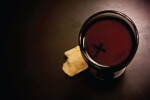Why Does Baptism Precede The Lord's Supper?

We regularly celebrate the Lord’s Supper during our corporate worship but the Supper is not for everyone in attendance, so we practice what is called ‘fencing the table.’ At Five Points, we fence the table by giving initial instructions as to who can partake of the communion meal and who cannot. One particular instruction during the fencing of the table leads to a common question I receive. I often say something like: “If you’re trusting in Christ alone for salvation and have been baptized in gospel preaching church, we invite you to partake of the meal with us.” Which leads to the question: “Why does baptism precede the Lord’s Supper?”
I’ll first note that the way we celebrate the Lord’s Supper at Five Points allows for paedobaptists [sprinkled; not immersed in water; before repentance of sins and profession of faith] to celebrate the Lord Jesus’s death, resurrection, and the hope of His return with credobaptists [immersed in water following faith and repentance]. Historically, the debate in regards to the Lord’s Supper was not about the Lord’s Supper, but what constitutes valid Christian baptism. Credobaptists have consistently denied access to the Lord’s Supper to paedobaptists based upon their convictions of the mode of baptism, namely that baptism in the New Testament was by immersion following repentance of sins and a profession of faith in Jesus Christ. At Five Points, we celebrate an ‘open table’ as we do not restrict access to the Lord’s Supper based on biblical convictions of the mode of baptism. We allow those who profess faith in Jesus and were baptized in a gospel preaching church, regardless of mode, to partake of the bread and the cup in celebration of the saving work of Jesus.
This, however, leads us to consider why fence the table at all? While historically the debate has focused on the mode of baptism, there’s almost no disagreement on the belief that only baptized believers can participate in the Lord’s Supper. This stems from Jesus instituting baptism as the sign of initiation into the new covenant community. One can only partake of the meal of the new covenant community if they are in the new covenant community! The pattern we see in New Testament is profession of faith, baptism, and then life in union with Christ by the Spirit in community with fellow believers. Baptism is always the first step of life in the new covenant. Jesus commanded us to make disciples by baptizing them in the name of Father, Son, and Spirit [Matthew 28.19]. Throughout the book of Acts, people are baptized in the name of Jesus [Acts 2.39, 8.16, 10.48] immediately following a profession of faith, and only then are they ‘added to the church’ [Acts 2.41]. Paul writes in Galatians 3.27 and Romans 6.5 of being baptized both into Christ and into the body of Christ. So baptism is the initial sign identifying someone with Christ and uniting them to the church.
While baptism does not save us, nor does partaking of the Lord’s Supper, they are the signs Jesus instituted for those He saved and to be observed until He returns. Since baptism the first step of the life of faith in the New Testament and the Lord’s Supper is the ongoing sign of the life of faith, we fence the table to believers who have been baptized in a gospel preaching church.

Comments
Login/Register to leave a comment
Velinka Marton May 8, 2019 7:27pm
Thank you for the explanation. While it raises additional questions, it certainly sheds light on the rationale behind the specific exhortation that accompanies the Lord's Supper and propels me to thoughtfully consider an oft overlooked topic. Thank you.